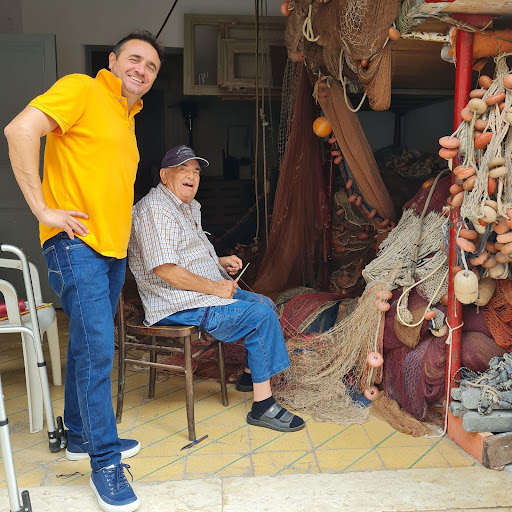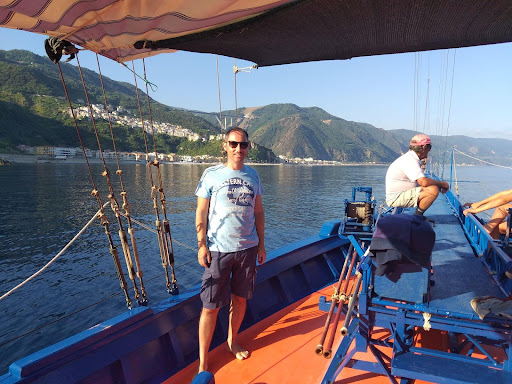Pescatourism industry in Mediterranean showing promising signs for increasing fisher income – According to a report by the European Parliament, pescatourism tourism can help to create jobs and revitalize communities that depend on fishing, especially in areas where it encompasses most of the economic activity in the area, depending on the region, the type of fisheries involved, and vessel sizes. For example, in most marine protected areas there are many positive examples of shared management and partnerships between marine protected areas management bodies and small-scale fishers for the promotion of pescatourism. Pescatourism also has environmental and social capabilities.
In the same Algerian study, it was found that pescatourism activities could potentially reduce pressure on fish stocks by up to 80%.
Pescatourism: A Different Type of Fishery Tourism
So pescatourism has some benefits, but what is it? The main difference between fishery tourism and pescatourism is that pescatourism involves tourist fishing activities that are carried out by professional fishers instead of tour guides.
The word “pescaturismo”, combines the Italian words for fishing and tourism, just like its onland cousin “agriturismo” which is a combination of agriculture and tourism. Through pescatourism, passengers take part in a centuries-old local value chain that responsibly feeds communities and stewards marine resources.
Pescatourism also generally does not include angling, which is when tourists will catch their own fish with a rod and pole, because the focus is on the fishermen and their activities. Pescatourism even has its own unique history; unlike general fishery tourism, which is thousands of years old, pescatourism was invented in Italy in 1982, after which it spread to other Mediterranean countries. It should be noted that ittitourism, on the other hand, is when tourist services are offered by fishers ashore, including gastronomic tourism and hospitality ventures that are again run by commercial fishermen instead of a resort, hotel, or independent restaurant.
There are 10 main objectives of pescatourism activities:
- Preserving fish stocks and marine and coastal environments through promotion of sustainable harvesting activities;
- Maintaining stable employment;
- Generating new sources of revenue;
- Involving women, youth, and elders in fishery communities through employment;
- Raising the profile of fishers and promoting appreciation for, and understanding of, their complex field of activity;
- Recovering the historical memory of the craft and passing it on;
- Enhancing the social and professional role of the fishers;
- Promoting the consumption of local and traditional foods;
- Using new technology to enhance the transfer of knowledge;
- Increasing public awareness of coastal biodiversity protection and management.

A best practice for the Mediterranean comes from southern Italy: Natale Amoroso, son of Salvatore–a historic fisherman in Trapani–is the president of a cooperative La Tramontana. This cooperative has diversified fishing activities to the point of shifting most of its business activity to pescatourism and ittitourism. A typical day on the fishing boat Nuovo Salvatore, after some morning maneuvers, includes pulling up fishing nets which were lowered into the seas the day before. As Amoroso explains,
“tourists must experience pulling up the nets and freeing fish from the mesh: it is the only way to fully immerse oneself in what has always been one of the most important economic resources in Trapani.”
A typical pescatourism excursion in Italy, for example, includes a fishing trip and often a light lunch based on typical fishing and local products. Costs generally range from a minimum of 25 euro to a maximum of 60 euro per person. Crucially, a simple Italian boat tour costs no less than 20 euro, and a minimal aperitif no less than 15 euro. Therefore, income is generated for the fishers while tourists benefit from a full cultural immersion experience surrounding artisanal fishing that includes tasting freshly caught fish and local products. For some this is also an emotional and priceless experience.

Pescatourim therefore has a strong precedence in Europe, with clearly defined laws and support for its undertaking. For example, the European Maritime and Fisheries Fund (EMFF) supports investment to help fishermen diversify their income by developing complementary activities, including additional on-board safety equipment, pescatourism, ittitourism, recreational and sport fishing services, and fishing-related educational activities. Unfortunately, other countries in the Mediterranean like Lebanon, Turkey and Tunisia struggle to get pescatourism legalized, but even here there is some hope. In Algeria, a pilot project was approved to great success, leading to the adoption of a national regulation of pescatourism and its implementation in the Taza National Park. Algeria is therefore becoming a good example in the South Mediterranean and in the African continent.
Bottlenecks and Legislative Constraints for Starting Pescatourism Businesses
Unfortunately, the implementation of pescatourism in European or Mediterranean countries can encounter many legislative constraints. Firstly, it should be emphasized that being a fisherman is one of the most risky professions out there; the risk of accident is 2.4 times higher than the mean value of all industrial sectors of the EU. The act of recovering fishing nets can be particularly dangerous.
Adverse weather conditions increase the risk of accidents and therefore careful planning of pescatourism trips is essential. Safety remains the principal concern of maritime authorities in the EU countries and elsewhere. The European Agency for Occupational Health and Safety (EU-OSHA) has developed a checklist suitable for determining the factors that compromise the safety of tourists. For example, tourists need a space specifically defined for them and this space should be distinctly separated from any elements of the fishing gear that could potentially compromise their safety. Also, the number of tourists allowed on board a vessel must be defined, as well as the number of crew needed to manage such a number of visitors.
Another problematic issue for potential fishers involved in pescatourism is proper taxation. For example, in France the annual income from pescatourism does not exceed a certain limit and constitutes less than 50% of income. Many countries give tax credits to their fishers, but it continues to be disputed if fishers rendering tourist services are still entitled to these tax rebates. If not, then such activity should be recorded on separate revenue accounts. Finally, it should be noted that in Italy, it is mandatory to have a bathroom on board in order to obtain a fishing tourism license.
Pescatourism industry in Mediterranean showing promising signs for increasing fisher income









